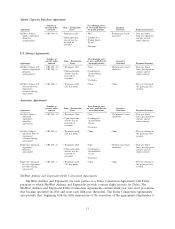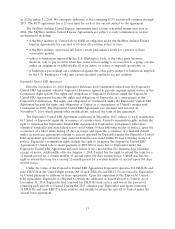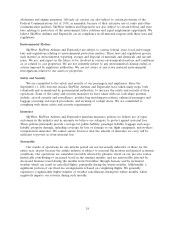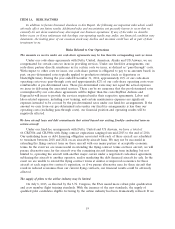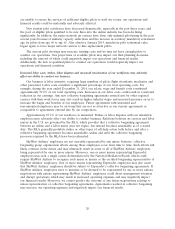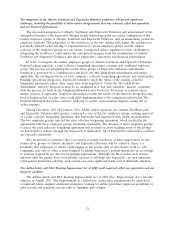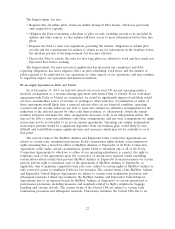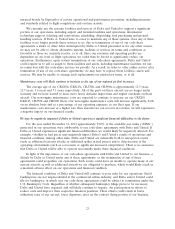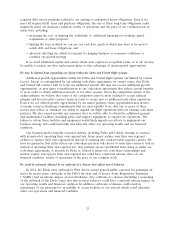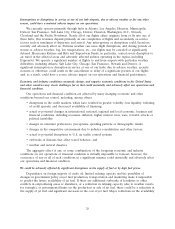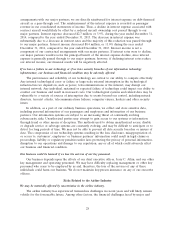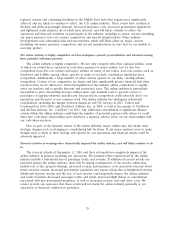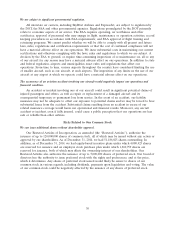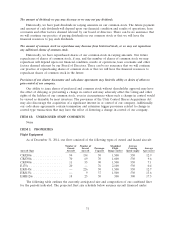SkyWest Airlines 2014 Annual Report Download - page 26
Download and view the complete annual report
Please find page 26 of the 2014 SkyWest Airlines annual report below. You can navigate through the pages in the report by either clicking on the pages listed below, or by using the keyword search tool below to find specific information within the annual report.The integration of the Atlantic Southeast and ExpressJet Delaware workforces will present significant
challenges, including the possibility of labor-related disagreements that may adversely affect our operations
and our financial performance.
The successful integration of Atlantic Southeast and ExpressJet Delaware and achievement of the
anticipated benefits of the ExpressJet Merger largely depend upon the successful combination of the
former employee groups of Atlantic Southeast and ExpressJet Delaware, and on maintaining productive
employee relations. The integration of the workforces of the two airlines will require the resolution of
potentially difficult issues relating to representation of various employee groups and the relative
seniority of the employee groups at each carrier. Unexpected delays, expenses or other challenges to
integrating the workforces could impact the anticipated synergies from the combination of Atlantic
Southeast and ExpressJet Delaware and affect ExpressJet’s operations and financial performance.
In order to integrate the former employee groups of Atlantic Southeast and ExpressJet Delaware,
ExpressJet must negotiate a joint collective bargaining agreement covering each combined employee
group. The process for integrating the former labor groups of ExpressJet Delaware and Atlantic
Southeast is governed by a combination of the RLA, the McCaskill-Bond Amendment, and where
applicable, the existing provisions of each company’s collective bargaining agreements and union policy.
Pending operational integration, ExpressJet intends to apply the terms of the existing collective
bargaining agreements unless other terms have been negotiated. Under the McCaskill-Bond
Amendment, seniority integration must be accomplished in a ‘‘fair and equitable’’ manner consistent
with the process set forth in the Allegheny-Mohawk Labor Protective Provisions or internal union
merger policies, if applicable. Employee dissatisfaction with the results of the seniority integration may
lead to litigation that in some cases could delay implementation of the integrated seniority list. The
National Mediation Board has exclusive authority to resolve representation disputes arising out of
airline mergers.
During December 2013 and January 2014, ALPA, which represents the Atlantic Southeast pilot
and ExpressJet Delaware pilot groups, conducted a vote of the two employee groups, seeking approval
of a joint collective bargaining agreement that ExpressJet had negotiated with ALPA representatives.
The two employee groups rejected the joint collective bargaining agreement, which resulted in the
agreements with those employee groups remaining amendable. The decision of those employee groups
to reject the joint collective bargaining agreement will preclude us from realizing some of the savings
we had hoped to achieve through the ExpressJet Combination. All of ExpressJet’s union labor contracts
are currently amendable.
We can provide no assurance that a successful or timely resolution of labor negotiations for the
former labor groups of Atlantic Southeast and ExpressJet Delaware will be achieved. There is a
possibility that employees or unions could engage in job actions such as slow-downs, work-to- rule
campaigns, sick-outs or other actions designed to disrupt ExpressJet’s normal operations, in an attempt
to pressure ExpressJet in collective bargaining negotiations. Although the RLA makes such actions
unlawful until the parties have been lawfully released to self-help, and ExpressJet can seek injunctive
relief against premature self-help, such actions can cause significant harm even if ultimately enjoined.
The Airline Safety and Pilot Training Improvement Act of 2009 could negatively affect our operations and our
financial condition.
The Airline Safety and Pilot Training Improvement Act of 2009 (the ‘‘Improvement Act’’) became
effective in August 2013. The Improvement Act added new certification requirements for entry-level
commercial pilots, requires additional emergency training for airline personnel, improves availability of
pilot records and mandates stricter rules to minimize pilot fatigue.
21


